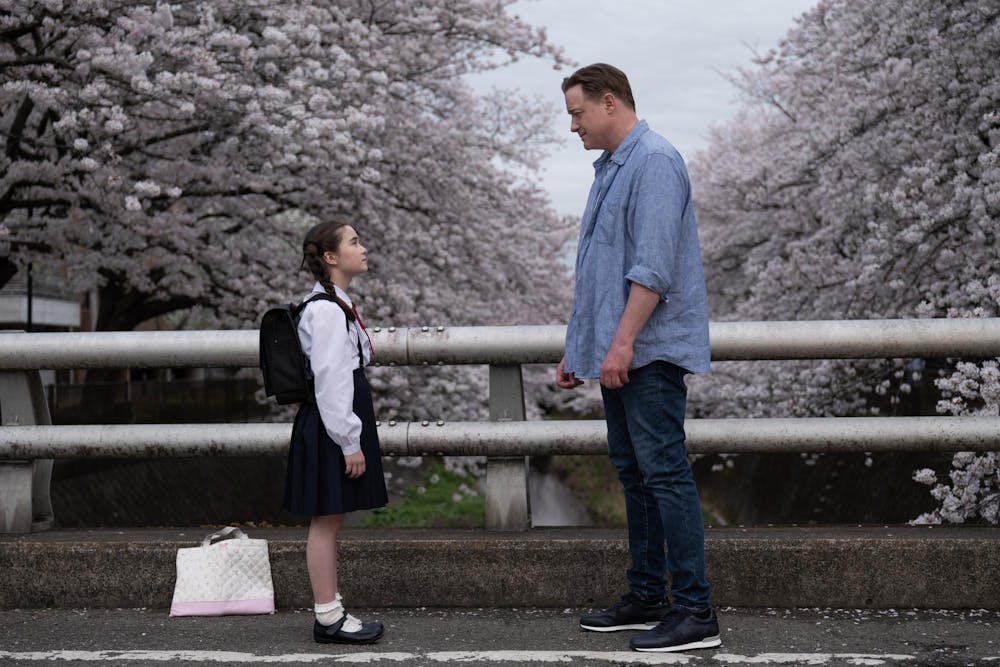In a world increasingly filled with artificiality — from intelligence to appearances — the question is raised, are replacements substantial enough to compensate for the real thing? Japan’s numerous rental family services certainly think so, where actors are hired to play various roles, like husbands, friends or fathers, for a variety of clients. Based on these businesses, “Rental Family” successfully portrays the profound significance of human connection and confirms the idea that family extends beyond blood.
Director Hikari’s second feature film premiered at the Paramount Theater Sunday night as the Virginia Film Festival’s closing film. Shortly before the premiere, the festival presented Hikari with their Breakthrough Director Award, bringing her work high acclaim before audiences viewed the film. Prior to “Rental Family,” Hikari was best known for her directorial debut, “37 Seconds,” and her work on Netflix’s “Beef.”
“Rental Family” follows Phillip, played by Brendan Fraser, a struggling American actor who stumbles upon Tokyo’s rental family service, eager to play “roles with a real meaning” after seven years of acting in trivial commercials. He quickly finds himself immersed in the business, navigating two central relationships with clients that blur the lines between acting and reality. Through Phillip’s role as a father to a young girl and a mentor to a retired actor, Hikari suggests that artificial relationships can produce genuine connections, inviting audiences to reflect on how we shape the lives of our loved ones.
A cross-cultural film, “Rental Family” incorporates both English and Japanese dialogue. In the post-screening discussion with Hikari, she noted that “Rental Family” was her homage to Japan, wanting the audience to experience the vibrant setting through Phillip’s shoes. She informed the crowd that her personality is embedded in Phillip’s character — his role as the “token American in Japan” mirrors her experience as “the token Asian girl in Utah.” The film intentionally opens with a striking montage of Tokyo, utilizing bright lighting and wide establishing shots to charm audiences with its inherent beauty.
First-year College student Olivia Zheng commented on Hikari’s careful portrayal of Japanese culture for Western audiences.
“There’s a lot of nuances in there about Japanese culture and society that … she distilled for a Western audience that made it more understandable,” Zheng said. “Overall, it was a very strong effort.”
Hikari intentionally blends humor and drama, ultimately wanting to craft a feel-good film. In one of the early scenes, Phillip is sent to a funeral under the role of “fat American” attendee, but is quickly shocked as he watches the seemingly dead man rise out of the casket. While Fraser’s humorous facial expressions delight the audience, Hikari intentionally utilizes the funeral setup to convey the intention behind the rental service — in this case, a suicidal man was forced to watch his family members experience his fake funeral to remind him of the importance of his presence.
Prior to his role as Phillip, Brendan Fraser established himself as more than capable of displaying immense vulnerability in a role after his performance in “The Whale,” which earned him the Academy Award’s coveted Best Actor accolade. Fraser’s interpretation of Phillip was similarly powerful, as evidenced by his moving expression of emotion — his subtle facial expressions served as silent speeches. However, his brows felt perpetually furrowed even during humorous scenes, suggesting that his comedic persona may not be as strong as his melancholy portrayals.
Nevertheless, Fraser’s work ethic is displayed by his commitment to his characters. For his character in “The Whale,” Fraser wore a 300-pound prosthetic suit, which served as the film that solidified his role as Philip, according to Hikari. For “Rental Family,” he spent four months in Japan filming and learning Japanese — an effort that is evident in his convincing performance.
The cast of supporting characters largely drove the narrative of “Rental Family.” Alongside Phillip were employees Shinji and Aiko, played by Takehiro Hira and Mari Yamamoto, respectively, who must determine when the service crosses the line from helpful to destructive. Additionally, Phillip’s two main clients, his false daughter Mia and journalistic muse Kikuo, played by Shannon Gorman and Akira Emoto, respectively, delivered compelling performances as they became overly dependent on Phillip’s service and broke down as they discovered the falsehood behind the relationship.
Despite the film’s 110-minute run-time, the relationships between Phillip and his clients felt underdeveloped and a bit on the nose. Some scenes featuring the father-daughter duo appeared premature — the daughter readily accepted Phillip as her absent father after a mere two scenes. Audiences could easily predict the story’s central conflict, leaving little room for speculation and interpretation.
Even so, the film’s originality and heartwarming tone are refreshing in today’s industry chock-full of sequels and reboots. Through “Rental Family,” Hikari made it clear that she is a fresh talent to watch, and she is just getting started.
“Rental Family” lands in theaters Nov. 21.







